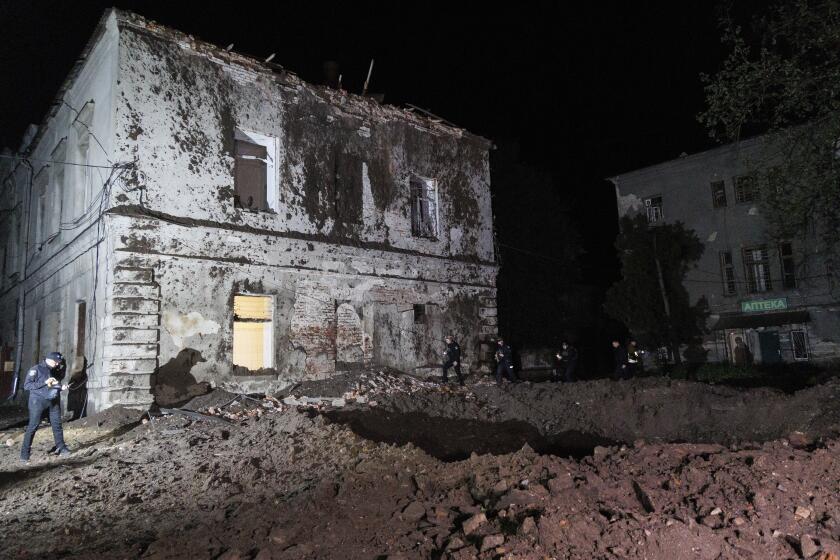Obama strongly defends phone and Internet surveillance
WASHINGTON — From the time he stepped onto the national stage, Barack Obama presented himself as a civil libertarian who would take a different path from that of his predecessor, who authorized surveillance on Americans in the fight against terrorism. “It is time to write a new chapter in our response to 9/11,” Obama said in a 2007 speech that outlined his vision for national security.
But revelations this week of a massive phone and Internet data collection program illustrated that as president, Obama has allowed the government to sweep up vast amounts of information about its citizens while establishing some checks on executive power.
The result has been a surveillance regime that largely continues the policies of the later years of George W. Bush’s administration, while provoking far less dissent from Congress.
Indeed, a major part of Obama’s national security legacy is likely to be as the president who institutionalized the broad powers in targeted killings abroad and in surveillance at home that Bush claimed for the federal government after the Sept. 11 attacks. Once seen as Republican initiatives, they are now endorsed by both parties.
Obama defended the extensive surveillance Friday, saying he’d come into office skeptical and had bolstered congressional oversight and judicial review.
“We scrubbed them thoroughly. We actually expanded some of the oversight, increased some of safeguards,” he said at a news conference in San Jose. “I think it’s important to recognize that you can’t have 100% security and also then have 100% privacy and zero inconvenience. We’re going to have to make choices as a society.”
Critics say Obama has not only embraced tactics he denounced as senator, but has also set up a framework that cements their place in law. They note he has often used the same justifications that he once blasted as the Bush administration’s “false choice between the liberties we cherish and the security we demand.”
“Clearly, he took a critical stance toward surveillance as a senator. That has been all but absent from his policies as president,” said Steven Aftergood, director of the Project on Government Secrecy at the American Federation of Scientists. “He has not really articulated or tried to justify the changes in his public positions. So there is a something of a credibility gap that has emerged as a result.”
The Obama administration’s programs could soon be reviewed by the Privacy and Civil Liberties Oversight Board, an independent federal panel that advises the president and lawmakers. The board, without confirmed appointees, had been essentially defunct for years. Obama waited until December 2011 to nominate David Medine as chairman. He was confirmed last month.
Medine declined to comment on the surveillance, but said he had requested a classified briefing. He said the board was “very energized and focused” on carrying out its mission, which he said seemed “ever more timely.”
Although his statements as a candidate were cheered by liberals in his party, it was also clear that Obama was far more constitutional law scholar than civil libertarian. Obama’s earliest criticism of the Bush-era programs focused more on the need for oversight by Congress and the courts than worries about Big Brother.
Obama continued that emphasis Friday. He sought to reassure Americans that “nobody is listening” to their telephone calls, but most of his remarks focused not on the substance of the government’s efforts to amass data but on process and legal structures. He made repeated references to the role of Congress and the courts in supervising the
programs, touting the “checks and balances” created in recent years, some of which were put in place in the last two years of Bush’s tenure.
“That’s not to suggest that you just say, ‘Trust me. We’re doing the right thing. We know who the bad guys are,’” Obama said. “And the reason that’s not how it works is because we’ve got congressional oversight and judicial oversight.”
That focus on process could also be seen in Obama’s voting record in the Senate on surveillance, which was a study in compromise.
In 2005, Obama spoke out against a reauthorization of the Patriot Act, which enhanced the power of law enforcement and intelligence agencies. But Obama’s key objection was about a lack of judicial review of searches, not about how much information was gathered.
“This legislation gives people no rights to appeal the need for such a search in a court of law,” he said. “No judge will hear their plea; no jury will hear their case.”
Obama eventually voted for a compromise that allowed court review of national security letters, which the FBI and other federal agencies use to demand such records as lists of phone calls. The compromise also added some restrictions to Section 215 requests, secret court orders for business records, such as the one leaked this week that exposed the government’s mass collection of phone records.
In 2007, Obama voted against the Protect America Act, the bill that empowered authorities to conduct the sort of Internet surveillance on foreigners also uncovered this week. But a year later, Obama voted to renew those powers as part of compromise bill to overhaul some surveillance practices.
The legislation established a legal framework and congressional oversight for wiretapping without warrants, a step critics say essentially codified the practice. It also brought lawmakers and the courts into process.
“The programs today are more or less what they were in 2007, 2008,” said Robert Chesney, a law professor at the University of Texas who studies national security law.
Congressional oversight and judicial review have not led to a shift in policy, experts note. The surveillance tends to have bipartisan support, and the secret federal court that reviews the government’s actions has not put up any known roadblocks.
That may be in part because lawmakers have little reason to balk in an age where the expectation of privacy is a shrinking notion. In a National Journal poll earlier this month, 85% of adults said it was likely that their “communications history, like phone calls, emails and Internet use” was “available for businesses, government, individuals and other groups to access” without consent.
With apparent court and congressional sanction, and broad public acceptance, some said, it would be dicier for a president not to exercise the powers at his disposal.
“There’s real risk that people might try to hurt America, and no president is going to ignore that. He’s not going to pull back on these programs unless they don’t work or there’s evidence they’re not legal,” Chesney said. “Can you imagine if a president went in and said, ‘I know Congress signed off on this, and courts approved it, but I’m not comfortable with this, therefore, we’re shutting it down.’? Now, that would leak.”
kathleen.hennessey@latimes.com
More to Read
Start your day right
Sign up for Essential California for news, features and recommendations from the L.A. Times and beyond in your inbox six days a week.
You may occasionally receive promotional content from the Los Angeles Times.








